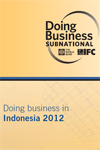Overview
Doing Business in Indonesia 2012 is the second subnational report of the Doing Business series in Indonesia. In 2010, quantitative indicators on business regulations were analyzed for 14 cities: Balikpapan, Banda Aceh, Bandung, Denpasar, Jakarta, Makassar, Manado, Palangka Raya, Palembang, Pekanbaru, Semarang, Surabaya, Surakarta, and Yogyakarta. This year, Doing Business in Indonesia 2012 documents improvements in the 14 cities previously measured and expands the analysis to 6 new cities across the nation: Batam, Gorontalo, Jambi, Mataram, Medan, and Pontianak.
Main Findings
- Over the past two years, all 14 cities measured for the second time carried out 22 business reforms to make it easier to start and operate a business. The average time to start a business and deal with construction permits have been reduced by more than 25% since 2010.
- No single city outperforms the others in all areas. It is easiest to start a business in Yogyakarta, deal with construction permits in Balikpapan, and register property in Bandung and Jakarta. It is most difficult to start a business in Manado and register property in Batam. Dealing with construction permits is most burdensome in Jakarta, while no building permits for commercial warehouses have been issued in Gorontalo since 2008.
- Starting a business is easiest in Yogyakarta, where it takes 29 days and costs 18.5% of income per capita to comply with the 8 requirements. It is more difficult in Manado, where it requires 11 procedures that take 34 days and cost 30.8%.
- Dealing with construction permits is easiest in Balikpapan, where it takes 52 days, but more cumbersome in Jakarta, where it takes 158 days. Local requirements remain responsible for the variation in the number of steps required to build a warehouse.
- It is easiest to register property in Bandung and Jakarta and more difficult in Batam—differences are mainly driven by the performance of national government agencies.
The report is endorsed by the State Ministry for Administrative Reforms and produced in partnership with the Regional Autonomy Watch (Komite Pemantauan Pelaksanaan Otonomi Daerah, KPPOD) and with support from the governments of Australia, Finland, the Netherlands, New Zealand, Switzerland, and IFC Indonesia Advisory Services.

